
More than 1.4 million women and girls in Africa risk losing access to life-saving care if a stockpile of US-owned contraceptives currently stored in Europe are destroyed in accordance with US government plans, according to NGO International Planned Parenthood Federation (IPPF).
The contraceptives, valued at $10 million (€8.5 million ) are currently stored in a warehouse in Belgium, but face destruction following the closure of key American aid agency United States Agency for International Development (USAID), as reported.
Plans for them to be incinerated in France in accordance with US government plans have sparked widespread condemnation from civil society organisations and politicians, who are calling for the supplies to be preserved.
The IPPF has attempted to purchase the stock from the US government but had its offer rejected.
The products were originally intended for distribution to lower-income countries by the now dismantled USAID.
Approximately 77% of the stock, many with expiration dates between 2027 and 2029, was intended for use in African nations including the Democratic Republic of the Congo (DRC), Mali, Kenya, Tanzania, and Zambia.
“We are facing a major challenge. The impact of the USAID funding cuts has already significantly affected the provision of sexual and reproductive health services in Tanzania - leading to a shortage of contraceptive commodities, especially implants," said Dr Bakari, Project Coordinator at UMATI, IPPF’s Member Association in Tanzania.
Tanzania was set to receive more than a million injectable contraceptives and 365,000 implants from the Brussels stockpile, accounting for more than 40% of the total shipment. These supplies represent over half of USAID’s annual support to Tanzania’s health system and 28% of the country’s total annual need.
“In Kenya, the effects of US funding disruptions are already being felt. The funding freeze has caused stock-outs of contraceptives, leaving facilities with less than five months' supply instead of the required 15 months,” said Nelly Munyasia, executive director for the Reproductive Health Network in Kenya also member of IPPF.**
She added that the withdrawal of USAID has created a 46% funding gap in Kenya’s national family planning programme.
The US has long been the largest bilateral donor to family planning, contributing $600 million annually which was 40% of global donor funding. The cancellation of pending procurement contracts has widened an existing global funding gap from $167 million to $210 million across 32 countries, according to the Reproductive Health Supplies Coalition (RHSC), a global partnership of public, private, and non-governmental organisations.
The coalition also warned of broader effects of burning this stash. The group said that, when a woman’s first choice of contraceptive is missing, she may opt for a less-preferred product, which could lead to a stock-out of that product if demand rises unexpectedly.
“When family planning stocks are compromised, the entire supply chain is at risk, requiring new funding, time, and coordination that cannot materialise at short notice,” they stated.
The RHSC has estimated that failure to deliver this stockpile to its intended recipients could result in 362,000 unintended pregnancies, 161,000 unplanned births, and 110,000 unsafe abortions.
Political opposition in Europe
During a briefing in late July, US State Department spokesperson Thomas Pigott said officials were “still in the process here in terms of determining the way forward” with regard to the Belgian stock.
As the supplies are reportedly set to be transferred to France for destruction, French Green Party politicians have appealed to President Emmanuel Macron to intervene.
“We cannot allow Donald Trump's anti-choice agenda to unfold on our territory. And so today, France must mediate with the Commission,” MEP Mélissa Camara (France/The Greens), one of the signatories of the letter, told Euronews.
"Unfortunately there is no legal basis for intervention by a European health authority, let alone the French national drug safety authority, to recover these medical products," the French health ministry told AFP.
"Since contraceptives are not drugs of major therapeutic interest, and in this case, we are not facing a supply shortage, we have no means to requisition the stocks," it added.
The ministry also said it had no information on where the contraceptives would be destroyed.







